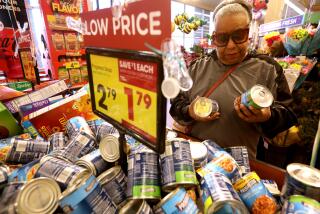‘Necessities’ of Today Take Toll on Paycheck
- Share via
One of the questions that’s nagged a good many people in recent years is why, with all of the money they make, they don’t feel better off.
They can’t just blame inflation. Indeed, except for the period of double-digit price increases and severe recession at the end of the last decade and the beginning of this one, real spending power has risen.
Moreover, one of the basic necessities in life--food--is no longer the budget buster for the average family that it once was. In the 1930s, about 40 cents of every dollar that a household spent went to keep the family eating. Today, the figure is only 16 cents, and that includes the cost of eating out more often.
Nonetheless, there’s a strong feeling that even with the extra cash in the paycheck, the amount of discretion that consumers have in spending is no greater than before. Whether this is true depends a lot on what’s defined as discretionary. But there’s no question that a good part of the family budget involves expenditures locked in by what most of us have come to view as the absolute requirements of modern life.
Auto, Housing Costs Up
Begin with transportation. Perhaps nobody forced the family breadwinner off the bus and into the car, or forced car buyers to buy stereos, air conditioners and plush interiors with their basic four wheels. Yet, even for many with few other luxuries, those are among the musts. Largely because cars cost so much, transportation expenses now exceed food, absorbing nearly 20 cents of every dollar spent.
Then there is housing. Not so many folks owned a place of their own 50 years ago. Now, housing expenses have grown to where they consume 30% of the family budget. Some of that is more for the good life--modern kitchens, extra bedrooms and built-in hot tubs--than for pure necessity. But it means that even in this age of affluence, the three basics of food, transportation and shelter account for two-thirds of what the average family spends.
That’s not the end of it. Where there used to be one breadwinner and a stay-at-home spouse providing lots of “free” labor, it now takes more hard cash to keep the house going. What’s more, even the do-it-yourself jobs are more expensive. The lawn, for instance, gets power-mowed. And if a power mower is a necessity, then who could deny the need for a conversion kit permitting the homeowner to use a portable electric drill to start the mower. Cost: $24.95.
Power mowers, drills, conversion kits and a houseful of other valuables also create another need not so pressing in the 1930s. Homeowners need more protection in the form of insurance and burglar alarms, hardly items purchased for raw enjoyment.
Taxes, Benefit Programs
“It looks as though we’re spending a lot more money these days but not getting anything new for it,” observes Audrey Freedman, an economist at the Conference Board in New York.
It’s a wonder we get to spend anything at all. The government spends a good deal more on our behalf. Close to 20% of personal income now goes for federal, state and local taxes, plus Social Security. And if we could have some of the cash that our employers lay out in health insurance and pension benefits for us--equivalent to nearly 40% of what they actually pay us--think how much more discretion we’d have.
Except that we’ve opted for a different kind of world than in the 1930s. Then, we took our chances on being healthy and employed. Now, some of what the average family makes goes to lessen life’s financial risks.
It also goes for something else: paying the cost of greater longevity. “Until this century, there really wasn’t any life after work,” Freedman says. Now, life spans and retirement practices are such that less than half of life is spent at work. Consequently, what people earn during their working years must support them over a much longer period. The vehicle for this, of course, is Social Security, pensions and other such programs.
What all this means is that a big chunk of current earnings can’t be spent today.
More to Read
Sign up for Essential California
The most important California stories and recommendations in your inbox every morning.
You may occasionally receive promotional content from the Los Angeles Times.






